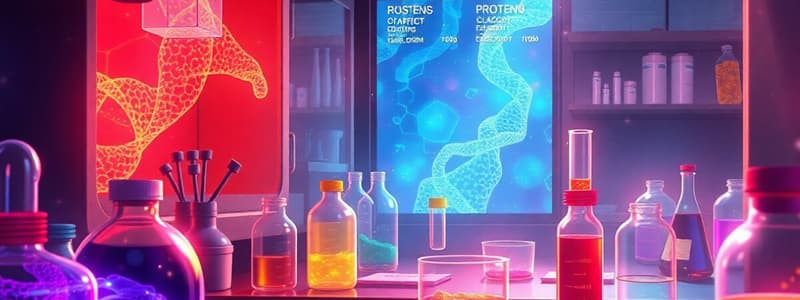Podcast
Questions and Answers
What is the main objective of isolating proteins?
What is the main objective of isolating proteins?
To isolate proteins and observe their physical properties.
What is gluten and how is it isolated from wheat?
What is gluten and how is it isolated from wheat?
Gluten is an insoluble protein left after starch is removed during the washing of dough.
What color change indicates the presence of starch when using iodine?
What color change indicates the presence of starch when using iodine?
- Yellow
- Green
- Blue/Black (correct)
- Red
The precipitate formed when acetic acid is added indicates the presence of starch.
The precipitate formed when acetic acid is added indicates the presence of starch.
What is the role of acetic acid in protein extraction from beans?
What is the role of acetic acid in protein extraction from beans?
Match the following proteins with their source:
Match the following proteins with their source:
What color change is observed during the isolation of albumin?
What color change is observed during the isolation of albumin?
Iodine changes to ______ in the presence of starch.
Iodine changes to ______ in the presence of starch.
Flashcards are hidden until you start studying
Study Notes
Isolation and Characterization of Proteins
- Objectives include isolating proteins, observing physical properties, and identifying specific proteins through color reactions.
Isolation of Gluten from Wheat
- Gluten is extracted from wheat flour, acting as an insoluble protein residue after starch removal.
- Materials Used: 100g wheat flour, iodine solution, cheesecloth.
- Procedure: Flour and water mixed to form dough; kneaded and washed to remove starch.
- Observations: Sticky, elastic gluten remains post-washing; iodine solution turns blue/black in the presence of starch.
- Theoretical Result: Successful washing indicates starch removal if iodine does not change color.
- Rationale: Iodine forms a blue/black complex with starch; no color change indicates the presence of pure gluten.
Isolation of Bean Protein
- Objective involves extracting proteins from soaked beans.
- Materials Used: 1 cup soaked beans, acetic acid, cheesecloth.
- Procedure: Ground beans mixed with water, filtered, and acetic acid added to precipitate proteins.
- Observations: White or off-white precipitate appears post-acid addition.
- Theoretical Result: Globulin proteins precipitate out with acid.
- Rationale: Acetic acid reduces protein solubility, causing them to clump and form visible precipitates.
Isolation of Albumin from Egg White
- Aims to isolate albumin, a key protein in egg white.
- Materials Used: Egg white, acetic acid, NaCl.
- Procedure: Egg white separated, weighed, and treated with acetic acid and NaCl to precipitate albumin.
- Observations: A white, gel-like substance forms, indicating albumin presence.
- Theoretical Result: Albumin should precipitate as a white solid.
- Color Change: No specific color change; visibility of albumin results from its solidification.
- Rationale: NaCl stabilizes protein precipitates, while acetic acid induces clumping.
Isolation of Myoglobin from Muscle
- Objective focuses on isolating myoglobin from minced beef, highlighting its role in oxygen transport.
- Materials Used: Minced beef, ammonium sulfate solution.
- Procedure: Beef mixed with ammonium sulfate, then filtered, and centrifuged for purification.
- Observations: A dark red liquid containing myoglobin is produced.
- Theoretical Result: Myoglobin, an oxygen-carrying protein, gives muscle its red coloration.
- Color Change: No significant color change noted; myoglobin is naturally red.
- Rationale: Myoglobin binds oxygen, maintaining muscle’s color and solubility.
Studying That Suits You
Use AI to generate personalized quizzes and flashcards to suit your learning preferences.




